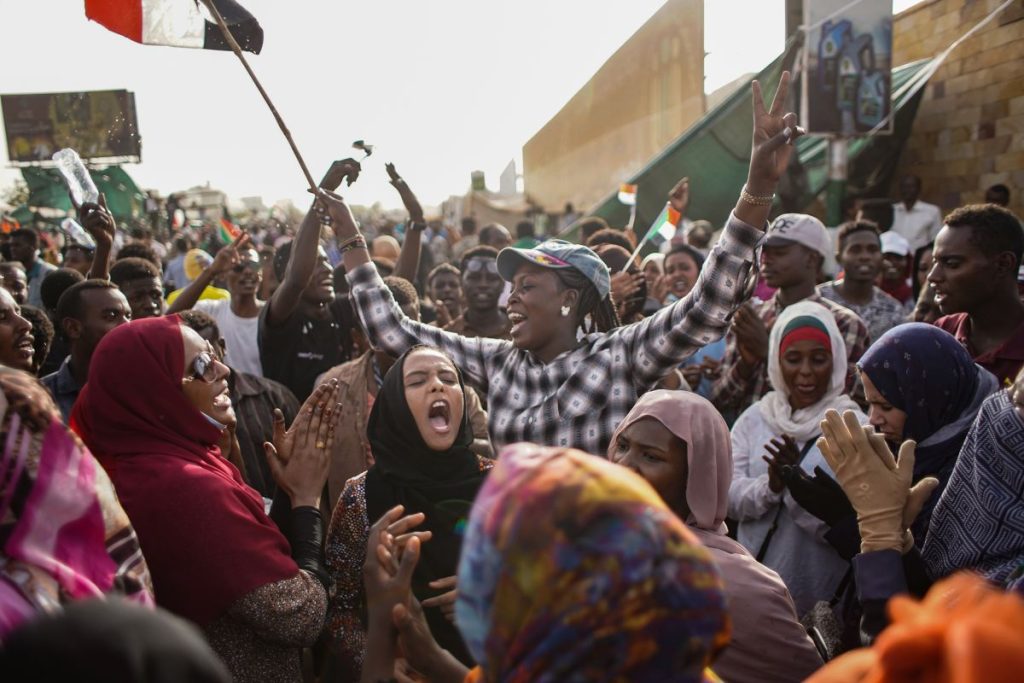After 30 years in power, Omar al-Bashir has been ousted in a military coup following a popular uprising. By Hawwa Adam
For years the international community has been trying to put Omar al-Bashir behind bars but in the end it was his own people that saw him jailed. After three decades of running the country with an iron grip, Bashir was ousted in a military coup on April 11 following massive street protests. He is now under arrest in Khartoum’s Kober prison. Although Sudan’s public prosecutor has begun investigating the 75-year-old on charges of money laundering and possession of large sums of foreign currency, military leaders have ruled out extraditing him to face trial for war crimes at the International Criminal Court (ICC) in The Hague. The demonstrations began several months ago after Bashir introduced emergency austerity measures that saw a sharp hike in the price of bread and fuel. But trouble had been brewing for some years due to a combination of crippling US sanctions and the loss of oil fields following South Sudan’s independence from Sudan in 2011. Although most sanctions were lifted in 2017, the economy remained in poor shape and there were sporadic outbreaks of unrest as living standards plunged. The current protests began last December as people from all walks of life took to the streets. They included, doctors, health workers, lawyers and journalists, many of them members of the Sudanese Professionals Association, which has helped to organise the mass sit-ins. Women were also notably out in force as well as young people. At first they focused on rising costs but then turned their ire on Bashir, demanding that he step down from office. The protests reached a climax on April 6 –the anniversary of a 1985 uprising that removed Sudan’s then hard man Jaafar Nimeiri. A few days later the military intervened. Bashir, a former army commander came to power in 1989 and assumed the presidency in 1993. Sanctions were imposed on Sudan in 1997 after the US accused it of supporting terrorist groups, including al-Qaida. After signing a peace deal to end the 21 year civil war between the north and south of the country in 2005, conflict in the marginalised western region of Darfur worsened and the government’s brutal crackdown led to the ICC’s accusations. Despite the issue of an international arrest warrant, Bashir won consecutive elections in 2010 and 2015, though the latter was boycotted by most opposition parties. While the crowds welcomed his overthrow, protest leaders have warned they will not accept a permanent military government and rejected its announcement that it would hand over power in two years’ time. In defiance of a curfew they maintained their occupation of the streets outside the military’s HQ, saying they had broken off talks with the government because it contained “remnants” of the old regime. They made it clear that it must dismiss three of its members, who until the April 6 were defending Bashir and involved in the use of excessive force to clear the streets. They three are Galal Aldien Alshiekh, former deputy head of the National Intelligence Security Service, former police chief Altayeb Babkir and Omar Alzein, head of the Islamic Front organisation in the armed forces.
“People fear the military council will try to stay in power as long as they can. And that is not driven by any actual things that are being done now, but by fear of the past. It is what happened after both of Sudan’s previous revolutions in 1964 and 1985,” an opposition source told Al-Jazeera. Demonstrators also swiftly rebuffed an offer of $3bn in aid to Sudan from Saudi Arabia and the United Arab Emirates on April 21, saying they could “keep their money”
“They are lobbying and using money to try and control Sudan. We have enough resources to look after ourselves and our interests,” Adil Gasem Alseed, a trader, told Al Jazeera.
“”We can rebuild our country without their help. We say thank you, please keep your money,” the 52-year-old said. After ordering protesters to take down their road blocks, the military took a more conciliatory stance. The head of the military transitional council, Lt-Gen Abdel Fattah Abdelrahman Burhan, told the BBC’s HARDTalk programme on April 22 that the army will not use force against protesters who want it to leave power.
“Protesters have a right to demonstrate anywhere, and we want to reach an agreement [to hand over power], we are not here to stay. The army will go back to the barracks,” he said. Meanwhile, a leader of one of several armed rebel groups in Sudan ordered a three-month ceasefire. Abdulaziz al-Hilu, of the Sudan People’s Liberation Movement-North (SPLM-N), which has been fighting in Blue Nile and South Kordofan states, said the truce was a “goodwill gesture” and called for immediate transfer of power to civilians.


